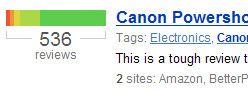Blackboxx?
 Grayboxx is a new local search site that shares many of Loladex’s goals, but goes about things in a different way.
Grayboxx is a new local search site that shares many of Loladex’s goals, but goes about things in a different way.
Specifically — as I understand it, anyway — they scour a bunch of sources, both online and offline, for “neighbor recommendations” of local businesses.
Many of these recommendations are implicit, as opposed to, say, the explicit endorsement of a favorable review on Yelp. The example Grayboxx cites is a repeat reservation at a restaurant: It’s a sign someone likes the place.
Grayboxx gathers a zillion such data points from sources it doesn’t disclose, runs them through a secret algorithm, and comes up with recommendations that extend even to obscure service providers in small towns — far wider and deeper coverage, in other words, than any competitor.
The company, which has been brewing for several years now, has large ambitions. It’s positioning its “PreferenceScoring” algorithm as the local equivalent of PageRank, the secret sauce that propelled Google into the stratosphere. And it has lined up a credible advisory board.
The site launched last week, sort of: It kicked off a national “tour” of the smaller towns where its coverage supposedly excels, starting with Burlington, VT. Since I don’t live in Burlington, I can’t judge what it’s doing there. Indeed, I’m not even sure what it means to be “on tour.”
However, the company also has a (non-public?) beta site that’s not limited to certain ZIPs. It’s very interesting. Grayboxx’s future shouldn’t be judged by it, I guess, but a few things are immediately clear:
- It looks nice. Simple, clean.
- It definitely has a lot of “neighbor recommendations,” even in small towns like mine, as promised.
- It doesn’t demand much of its users, which is good.
- It doesn’t tell users how it makes the sausage.
This last point, I think, may be crucial. Grayboxx is creating a mystique around its “patent-pending” methodology that may come back to bite it. Its claimed value — Find what your neighbors think — is a lofty one, but vulnerable to skeptics.
Grayboxx may be the site’s name, but the beta behaves more like a black box. It doesn’t explain the nature of its “neighbor recommendations” for any listing, nor does it provide much extra information or link to many user reviews. We’re left with the raw rankings.
The thing about black boxes, of course, is that they must work. Judgment is swift, and you don’t get to explain away bad results. Google aced this test in its early days, which is why it’s on top today. I’m not sure whether Grayboxx can follow.
Certainly I wasn’t bowled over by the results on the beta site. The algorithm doesn’t seem to capture character or local flavor, leaning toward bland businesses and chains. And some results were just weird.
As an example, I believe most of my neighbors here in Leesburg, Va., would recommend Lightfoot and Tuscarora Mill as two of the top five restaurants in town. I’d rank Tuskie’s first myself.
Grayboxx “ranked” them at #103 and #104 today, behind the hot-dog place in the food court (#38), Domino’s (#42, #89, #93), Subway (#46), Starbucks (#61, #74), a grocery store (#77), Taco Bell (#82), and many more, inluding several places that are closed.
Luckily for Tuskie’s — which has gotten heavy praise in Wine Spectator, Washingtonian and elsewhere — it still ranks as a better option than Ashburn Eye Care.
By one place.
Meanwhile the top-ranked restaurant near Leesburg, according to Grayboxx, is the Rail Stop in nearby Ashburn. I had never heard of it, so I looked it up. It’s a good restaurant but it’s actually in The Plains, a town almost 40 miles from Ashburn.
True, I can force Lightfoot and Tuskies to the top of the results with two rather non-obvious clicks. Grayboxx seems to have the ingredients for a good ranking system, but is outsmarting itself.
Who knows whether such observations are fair? None of the towns I tested have truly launched, so it’s too early to say. Still, Peter Krasilovsky points at a review from a Burlington resident who had a similar reaction: Grayboxx results are too “obvious,” providing little insight beyond popularity.
Certainly the black box needs some tweaking during Grayboxx’s rollout period, and the data needs scrubbing. (Ashburn Eye Care?) I believe the idea itself is workable, although the blandness factor may never be stamped out entirely — and threatens to stop Grayboxx from being any more helpful than, say, the Yellow Pages.
The underlying issue, I think, is that “real world” word of mouth involves a particular person (me) getting advice from particular people (my friends). It’s not as easy as watching to see where most locals go, or we’d all end up at the food court.
I’m sure that Grayboxx can re-weight its sources, rejigger its algorithm, and come up with more characterful recommendations. But local is above all personal, which means that emulating a non-personalized measure such as PageRank isn’t the best approach, no matter how well it’s done.
As long as every Grayboxx user is getting the same recommendations, something important is being lost.

 This is far more useful than an average star rating — although Summize offers those, too.
This is far more useful than an average star rating — although Summize offers those, too.